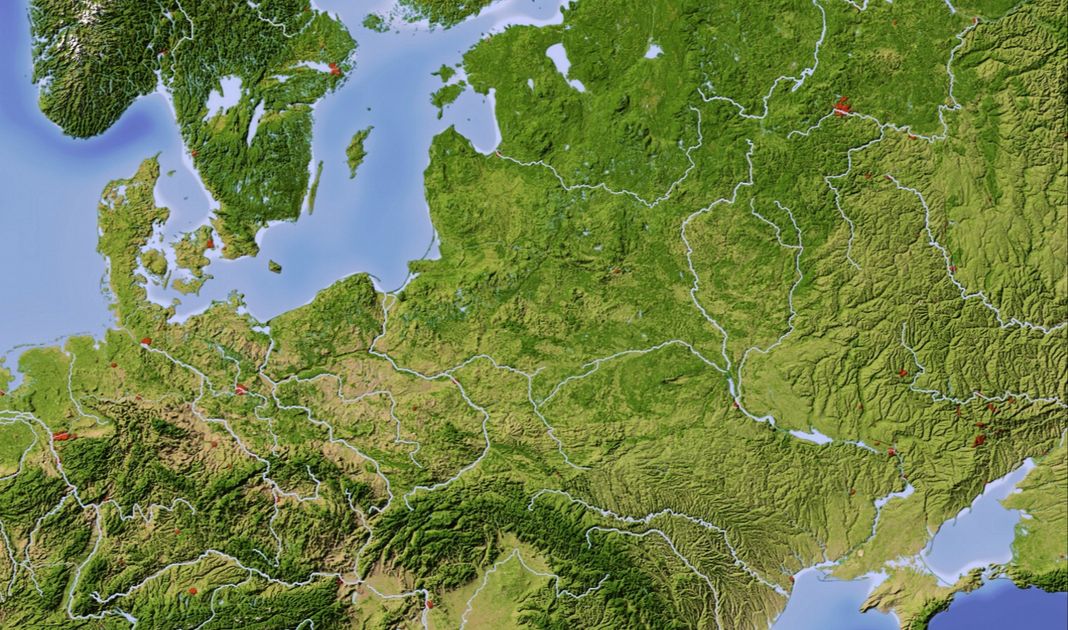Intermarium Weekly 17-23.02.2020

“Defender of Europe 2020”
The head of the Duma Committee on Defense, Vladimir Shamanov, said that Russia would conduct operational measures in response to the next large-scale NATO exercises near the borders of the Russian Federation. Whilst answering a question about the upcoming maneuvers of the “Defender of Europe 2020” Shamanov stated that the situation is being monitored calmly, without “commotion and fright”: “We are armed enough, we have enough forces and means,” the deputy noted. Shamanov also said that in response to NATO’s actions, Russia will conduct a series of “operational activities” on its territory.
Ukraine starts coughing and coronavirus can cause the serious political crisis in the country
Serious questions are justifiably being raised about who thought of giving the order to return the Ukrainian citizens from Wuhan, China on February 20, the anniversary of events in Kiev (known as a “revolution of dignity”)? The President of Ukraine Volodymyr Zelensky called his own country “Europe of the Middle Ages”, outraged by the reaction of Ukrainians to repatriation of Ukrainian citizens previously stranded in the chinese city of Wuhan. Locals in the Poltava region, where a quarantine facility was set up initiated a huge protest that still is flurrying the entire country. During the protest, more than dozen policemen and locals were injured. In his speech addressing the events, Zelensky nervously asked his compatriots whether they are “a flock or a nation”.
Unfortunately, the incident divided the country. Those outraged by the public reaction were mostly Russian-speaking Ukrainians, whilst, it was predominantly those living in the Western Ukraine that expressed xenophobic and racist sentiments regarding the Wuhan returnees. Ukrainian Ministry of Internal Affairs emphasized that these incidents are artificial in nature, orchestrated by previously dominant political groups which are hoping to regain power in the upcoming elections. In the meantime, Zelensky’s approval ratings are slumping; if during autumn the dissatisfaction with Zelensky was at around 17%, it has now reached 53%. Concurrently, clashes erupted in Donbas between the separatist forces and Ukrainian Army. These coincided with discussions in the UN Security Council, and both sides used the opportunity to assign blame blamed each other for the skirmishes. the Ukrainian delegation has also offered to send peacekeepers to Donbas.
The weakness of Ukraine will definitely provoke Russia, as the weakness and instability of any country tends to provoke the predatory instincts of neighboring countries. Seemingly, Putin still believes he can reach an agreement with Zelensky on improving relations between the two countries – of course on terms set by the Kremlin. Former US Special Envoy to Ukraine, Kurt Volker stated that Russia has not achieved its strategic aim yet, which is to establish in Kiev a loyal regime that will be able to cooperate on Russian terms or just to dismantle Ukraine as an independent state. Volker believes the former scenario is more likely to materialize.
The National Security and Defense Council of Ukraine, approved the national security and defense strategy named “Human Security – National Security.” The highest priority and the main task of the state is to establish peace as a guarantee of the country’s development. The document underscores, however, that this should not happen at the cost of losing sovereignty and territory. This new strategy is an indication that the new geopolitical priority in Zelensky’s Administration is to establish less belligerent relations with the Russian Federation and to find a peaceful solution to the conflict in Eastern Ukraine – which is a stark change compared to the previous administration.
Poland and Ukraine: interesting developments…
In 2019, Ukrainians in Poland spent a record amount of money – the amount of money spent over the year doubled, while transfers to Ukraine almost did not increase. Many specialists consider this a negative development, since transfers of Ukrainians from the European Union provided a significant stimulus to the Ukrainian economy.
Poland again was mentioned in Ukraine, when the IMF delegation arrived in Ukraine demanding loosening the regulations concerning sales and purchases arable land. According to the IMF Ukraine will find it impossible to achieve sustained economic development unless those laws are changed. Thus, the country needs to ensure annual economic growth of 6% over 20 years in order to reach the level of development Poland enjoys now; partial reforms and an average growth rate of 4% will solve this problem only by half, and so, according to the IMF the only solution is to allow foreign companies and private business to acquire Ukrainian land. However, this is a highly divisive issue for the Ukrainians; introduction of the new legislation has already resulted in violent clashes with the police.
Georgia, Ukraine and Moldova request financial assistance from the West
The foreign ministers of Ukraine, Georgia and Moldova during the Munich Security Conference signed a joint appeal to the European Commission on the importance of proper financial support for the Eastern Partnership countries. The appeal for financial support came in the framework of the next “Multi-Year Financial Perspective” of the EU for 2021-27, which is now being hammered out by the EU institutions.
The factor of China in the region…
Despite the ongoing coronavirus outbreak Beijing is trying to return the country back to normal functioning. China expects Ukraine to provide state guarantees for investing $600 million in the construction of a new block of Slaviansk thermal power plant. The contract is estimated to be worth around $684.296 million. 70% of the funds needed for reconstruction should be provided by credit from a Chinese bank. The loan is a next step in the cooperation established back in 2018, when Ukraine and China agreed to joint reconstruction of TPP Slaviansk (Eastern Ukraine). It would be interesting to observe Ukrainian and American reaction to this attractive Chinese offer, because it is very hard to imagine that European investments would come to this highly dangerous area of conflict. At the same time, Turkey is ready to invest half a million dollars for important infrastructure projects in Southern Ukraine. For Turkey, this region has geopolitical and historical importance because those territories used to belong to the Ottoman Empire for several hundred years.
Another important case in Ukraine involving the ongoing rivalry between the PRC and the US is the future of Aerospace company MotorSich. MotorSich, a renowned aerospace company specializing in construction of jet engines is one of the last remnants of the Soviet industry and engineering that still exists in Ukraine. MotorSich unique portfolio is the reason China sought to acquire the company for a while now. Jet engines are one of areas where Chinese own indigenous sector is still lacking, as evidenced by the engine issues haunting the J-20 fifth generation fighter project.
And it is for the very same reason, that the US has been looking to block the acquisition of MotorSich by the Beijing based Skyrizon. In the past, the White House sought to attract US based investors to place a counter offer for MotorSich, but so far to no avail.
Since then, the US has seemingly looked to prevent Chinese acquisition of the company by using political pressure. Last week news surfaced, that the Antimonopoly committee of Ukraine is ready to block the purchase of the company by China due to alleged irregularities. Meanwhile, Ukrainian experts expressed concerns that China had already managed to obtain the entire documentation about unique technologies that are a part of MotorSich portfolio, but scrapping the deal will result either in the company’s bankruptcy, or it having to start selling its products to Russia again, obviously an undesirable outcome for the Ukrainians. The Chinese company Skyrizon, according to the report, already controls 80% of MotorSich assets.
Georgian deep-sea port of Anaklia Port Project is the analog of Central Communications Port in Poland (CPK). Recently, the Georgian government has categorically rejected the possibility of renewing the contract with the Anaklia Development Consortium previously tasked with construction of the deep-sea port. The Georgian government continues to look for a new investor that would be able to meet the criteria is set forth. The Anaklia port is slated to breathe life back into the Caucasus and Central Asia, creating trade routes for neighboring landlocked nations such as Armenia, Azerbaijan, Kazakhstan, Uzbekistan, Turkmenistan, Kyrgyzstan and Tajikistan. Located on the eastern shore of the Black Sea, Anaklia represents the shortest route from China to Europe, and has become one of the key investments of $40 billion in Chinese infrastructure investments under the auspices of the Silk Road Development Fund. The re-establishment of the Silk Road is an important foreign policy priority for Georgia and is based on the Agreement on the Deep and Comprehensive Free Trade Agreement (DCFTA) the government signed with the European Union in December 2014.
Regional cooperation among the countries of Intermarium…
Lithuanian Railways (Lietuvos Gelezinkeliai, LG) officially opened the 19 km long transboundary section of Mazeikiai (Lithuania) – Renge (Latvia) railway. This happened 12 years after Lithuania unilaterally decided to close and dismantle the site. The symbolic event at the Mazeikiai station was attended by officials from the governments of both countries. The first freight train to traverse the newly reopened line delivered 2.7 thousand tons of light oil products to Latvia from the Polish company Orlen. This is a welcome development for the Latvians as well, since it opens up a way to substitute trade with Russia by attracting additional cargo from Orlen.
From February 17 to 21, Ukrainian paratroopers, together with Lithuanian and Polish military brigades, took part in the “Brave Band” command and staff training. LITPOLUKRBRIG troops conducted joint action training enhancing their interoperability. The military dimension is and will remain a crucial component of cooperation between the countries of the Intermarium.
Belarus might get what it wanted from the Kremlin.
Certainly, this is not a complete victory for Lukashenka, but it sounds like the first ring of it. Putin offered to compensate Belarus with $200 million Minsks has lost due to the “tax maneuver” Russia has pulled of before. The President of Belarus called the proposal unexpected and stated that the Belarusian side would try to carefully look at the conditions Putin has set forth. However, according to Lukashenka, at the end of the day arithmetic of the deal does not really matter, since there is no feasible alternative to Russia, and “Russia can sell [its oil] at fair prices, or it can sell it at unfair prices because it is a monopolist in this a situation.” Nevertheless, Lukashenka concluded that “ at least it’s a step forward.” It should be clear that Belarus has not finalised any annual contracts for the supply of Russian oil yet.
Nevertheless, it is possible to assume that Putin is only buying some strategic time after the tremendous activities undertaken by European and American diplomats. Especially if we take into account that according to recent forecasts a recession is in the cards for Belarus this year. Apart from the global economic slowdown this is inextricably linked with the recent “oil war” between Russia and Belarus. The risks and uncertainties surrounding the prices of imported energy create a serious factor of instability for the Belarusian economy. Two days before Putin made his offer, Igor Sechin, the head of the “Rosneft”, arrived in Minsk and discussed prospects for future cooperation with Lukashenka. A couple years ago “Rosneft” planned to become the biggest supplier of oil to Belarus, but “Gazprom” stepped in and blocked this initiative.
To Belarus’s north Lithuanian conservatives, liberals and public figures created a unified front against the newly constructed Belarusian Nuclear Power Plant (BelAES). Last Saturday Lithuanians sent a letter to the Lukashenka opposing opening of the power plant and collected signatures for a petition to the European Parliament (EP). The first congress of the Movement against the Belarusian NPP was also attended by the former Minister of Foreign Affairs of Ukraine Pavlo Klimkin, a signatory of the independence of Belarus, the head of the center “European Dialogue” Anatoli Lyabedzka, a representative of the Christian Democrats of Belarus, Pavel Sevyarynets, and others. The key message was that Russia is behind this project and it threatens both the Baltic states and Belarus itself.
Interestingly, Belarus achieved the 9th position according to the 2019 Global Militarization Index which was prepared by experts at the Bonn International Conversion Center.
Autor
Ridvan Bari Urcosta
Senior Analyst at Strategy&Future






Trwa ładowanie...